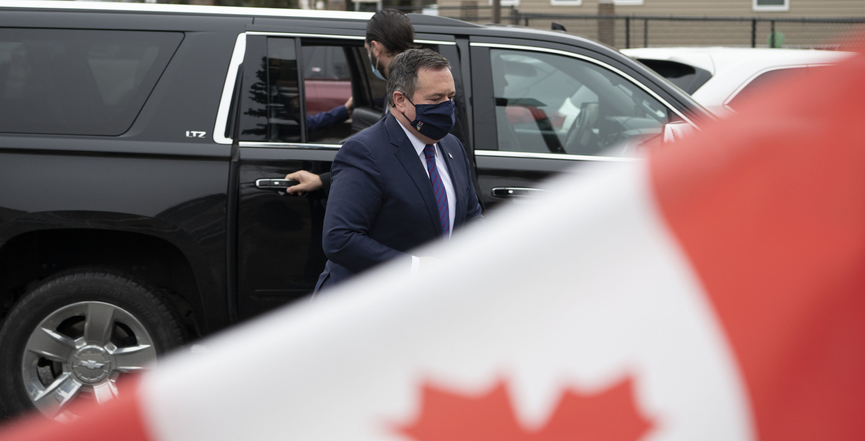It’s not very reassuring to learn Alberta Premier Jason Kenney treats calls for stricter measures to control resurgent COVID-19 infections as “political pressure.”
But yesterday, after Alberta on Wednesday surpassed 400 new cases in a single day for the first time since the coronavirus pandemic began, Kenney did just that.
The soaring COVID-19 caseload does not come as a complete surprise. Coming off the “near-normal” school reopening Kenney’s United Conservative Party government blithely pressed ahead with last month and a Thanksgiving weekend free of mandatory social distancing rules just under two weeks ago, the big bump in case numbers is right on schedule.
COVID-19 has been with us long enough now that we don’t all have to be epidemiologists to know how the disease works. And yesterday, new cases in Alberta rose again from 406 the day before to 427.
It seems likely there will be even more records broken in the days ahead. There are now 3,519 reported active cases in the province, which almost certainly means there are plenty more.
But asked what he was going to do about it, the premier answered, in effect, not much.
“We cannot completely exclude the possibility of targeted, limited restrictions in the future if we determine the case load could begin to jeopardize the health-care system,” Kenney said from home, where he is in isolation after being at events with Municipal Affairs Minister Tracy Allard, who has tested positive for the virus.
“But if we do that it will be based, not on a hunch, not on political pressure, but on data,” the premier insisted. (Emphasis added.)
Readers can be comfortable betting Premier Kenney’s interpretation of data is never going to contradict his heartfelt conviction that economic health is more important than the physical health of individual human beings.
Even the hospitality industry is safe from mandatory restrictions, he indicated, citing public opinion polling that suggests Albertans don’t like lockdowns — who does? — and are skeptical that they work, which is another matter entirely.
“I think intuition of Albertans who are skeptical about lockdowns is pretty correct,” he said, letting us know where he stands on that question. To wit: he’s data skeptical.
If this doesn’t tell you where the UCP is going with this, consider Banff-Kananaskis MLA Miranda Rosin, whose cringeworthy response to a constituent’s social media plea for the government to “STOP the COVID concentration camps” had eyes bugging out all over the province.
“If the rumours are true, those are being set up by the federal government, not us,” Rosin chirped in her social media response. “Rest assured we would never create such a thing.”
It’s highly unlikely Rosen meant to say Ottawa is planning internment camps for people with COVID-19, any more than the provincial government intends to use its temporary clinic at Calgary’s Peter Lougheed Hospital for such a purpose. And it’s a little harsh to suggest she intended to spread a “hardcore conspiracy theory,” as one of the people interviewed by the CBC reporter seemed to say.
But the 20-something MLA is clearly not one of the sharper implements in the UCP toolshed, and her remarks do hint that a decision has been made in the government’s caucus not to antagonize the kind of supporters attracted to QAnon nuttery, of which there are many in the UCP base.
In other words, Rosen was only guilty of doing a poor job of channelling her boss’s messaging, as when he accuses critics of the government’s lackadaisical response to the coronavirus of political chicanery.
Meanwhile, what should be a health care scandal is lost in the distraction
If there’s good news for the UCP in the daily updates to the coronavirus story, it’s the way it’s pushed the nasty plan to create a loophole to force hospitalized patients to pay for many of their clinical medicines off the front page.
It certainly goes against the spirit of the Canada Health Act and the whole idea of public health care, but the UCP seems to have put some thought into carving out exceptions that will let them dump the high cost of medications onto cancer victims, seniors in long-term care, and even patients in palliative care.
The scam seems to be to have as much treatment as possible take place just outside hospitals, in outpatient clinics, ambulatory care settings and all the other bureaucratic euphemisms that can be invented to suggest the patient is on the wrong side of a hospital threshold.
Obviously this is a major step backward for public health care, and potentially a huge hardship for families and individuals who have the bad luck to lack an employer drug plan. In addition, the savings to the health care system will be insignificant.
So this should be a major scandal. Thanks to the distraction caused by COVID-19, however, the UCP seems to be getting away with it.
David Climenhaga, author of the Alberta Diary blog, is a journalist, author, journalism teacher, poet and trade union communicator who has worked in senior writing and editing positions at The Globe and Mail and the Calgary Herald.
Image: Alberta Newsroom/Flickr



